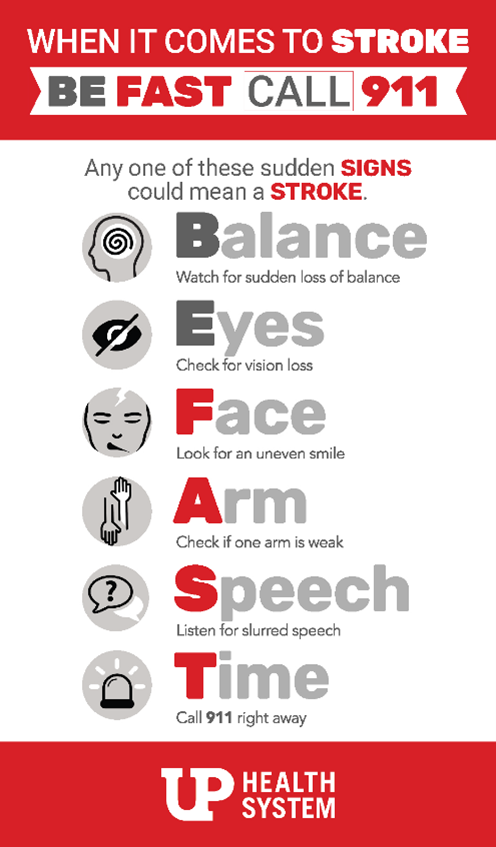Understanding Stroke: What You Need to Know
December 18, 2024

By: Nicole Brinkman, Stroke and Sepsis Coordinator, UP Health System – Marquette
A stroke is a serious medical emergency that occurs when blood flow to the brain is interrupted or severely decreased which deprives the brain of oxygen and nutrients. This happens either due to a blockage (ischemic stroke) or a burst blood vessel (hemorrhagic stroke). Strokes can have life-altering consequences and brain cells begin to die within minutes of a stroke. Understanding the risks, recognizing the symptoms and acting quickly can make a significant difference in outcomes.
Stroke is a leading cause of death and serious long-term disability for Americans. According to the Centers for Disease Control and Prevention, in 2022, one in six deaths from cardiovascular disease was due to stroke. On average, someone suffers a stroke every 40 seconds and someone dies of a stroke every 3 minutes and 11 seconds in the United States.
The symptoms of a stroke are distinct because they happen suddenly. Call 911 if you or someone you know experience any of the following symptoms:

- Sudden numbness or weakness in the face, arm or leg, particularly on one side of the body
- Confusion, trouble speaking or difficulty understanding speech
- Vision problems in one or both eyes
- Difficulty walking, dizziness or loss of coordination
- Severe headache with no known cause
Remember BE FAST:
- Balance: Sudden loss of balance or coordination.
- Eyes: Blurry or lost vision.
- Face: Drooping or uneven smile.
- Arm: Weakness or numbness, often in one arm.
- Speech: Slurred or difficult speech.
- Time: Call 911 immediately.
Stroke Risk Factors:
While anyone can experience a stroke, certain factors increase the risk:
- Lifestyle factors: smoking, excessive alcohol use, poor diet, and physical inactivity can elevate stroke risk.
- Medical conditions: high blood pressure, diabetes, high cholesterol, heart disease, atrial fibrillation and sleep apnea are significant contributors.
- Age and family history: the risk of stroke increases with age and having a family history of stroke can also elevate risk.
Steps to Prevent Stroke:
Preventing stroke involves managing risk factors through healthy lifestyle choices. The good news is that many strokes are preventable through lifestyle changes and managing underlying health conditions:
- Maintain a healthy diet low in sodium and saturated fats
- Exercise regularly to improve cardiovascular health
- Quit smoking and limit alcohol consumption
- Manage chronic conditions such as hypertension and diabetes with the help of your healthcare provider
Adopting a healthy lifestyle is essential to reducing stroke risk. Eat a balanced diet rich in fruits, vegetables, whole grains, and lean proteins. Stay active by aiming for 7,000–10,000 steps a day or equivalent exercise. Regular checkups to monitor and manage chronic conditions are also vital.
Establishing a primary care provider to monitor and manage your health through regular checkups is vital. A good, communicative relationship with a regular provider who knows your history can help tremendously in identifying risk factors, diagnosing and managing conditions and getting timely treatment. Need a provider? Visit UPHealthSystem.com/Find-a-Doctor to get connected to one.
UP Health System – Marquette (UPHS – Marquette) is a Primary Stroke Center. Certification means that UPHS – Marquette has demonstrated a commitment to providing the highest quality care when evaluated against meticulous standards of performance for stroke. Adhering to national standards and guidelines can significantly improve outcomes for stroke patients.
Acting fast saves lives.
Remember, a stroke is a medical emergency. If you or someone else experiences symptoms, seek immediate medical attention. Understanding stroke symptoms, managing risk factors and making healthy lifestyle choices can significantly reduce the risk of stroke and improve outcomes.
Learn more by visiting cdc.gov/stroke or stroke.org. Need a provider? Call 844.411.UPHS (8747) or visit UPHealthSystem.com and click on the Find a Provider tab to get connected.
UP Health System – Marquette (UPHS – Marquette) is a Certified Primary Stroke Center. Certification means that UPHS – Marquette has demonstrated a commitment to providing the highest quality care when evaluated against meticulous standards of performance for stroke. Adhering to national standards and guidelines can significantly improve outcomes for stroke patients. The Joint Commission’s Primary Stroke Center Certification is based on the recommendations for primary stroke centers published by the Brain Attack Coalition and the American Stroke Association’s guidelines for stroke care.
For more information, visit The Joint Commission website.

